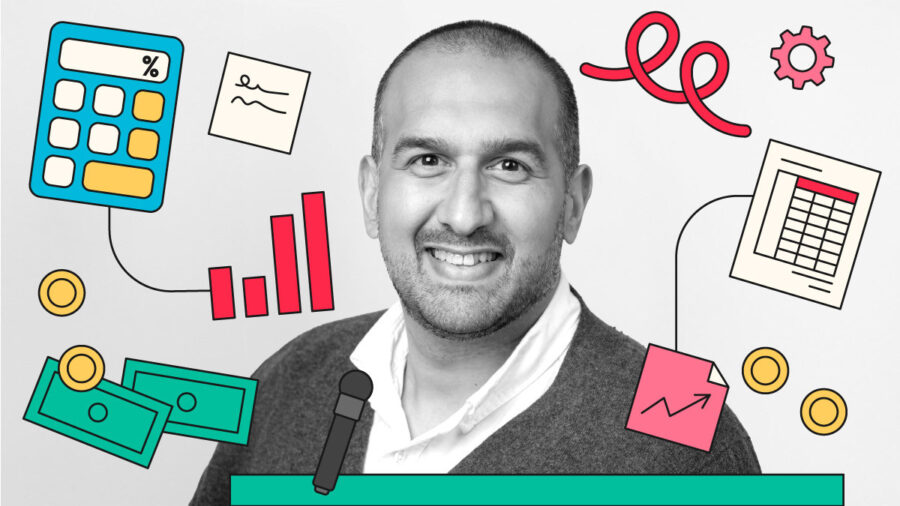
For Amman Boughan, finance isn’t a back-office function – it’s a bridge between purpose and performance. As group CFO and deputy CEO of Pagabo Group, he oversees a growing ecosystem that includes public sector framework specialist Pagabo, contract management platform Sypro and social value consultancy Loop. Together, these businesses are reshaping how the built environment delivers impact across people, places and the planet.
Since joining the Hull-based group in 2023, Boughan has helped steer its expansion following investment – balancing growth with the challenge of digital transformation. With a background spanning Preventx, Sky Betting & Gaming and Lights4Fun, he believes great finance leadership comes from thinking like an owner, not just a manager.
Here, he shares how he’s redefining the CFO role as both strategist and connector – linking data, people and purpose while keeping perspective as a father of four.
How did you become a CFO?
My background is actually in sports. I played rugby union and I studied politics at university, so there was nothing about that path that pointed to a finance career. I started in a multidisciplinary professional services organisation and spent several years advising businesses, mainly around mergers and acquisitions.
At some point, I realised I needed to decide what I wanted long-term. The CFO role felt like the pinnacle of a finance career, so that became my goal. I’ve been fortunate to hold that position for about seven years now.
What skills or traits does a good finance leader need?
Today’s CFO needs to be multifaceted. Financial mastery is a given but, for me, strategic vision is important. Leadership and influence are just as critical.
I also believe being digitally enabled and tech-savvy is important now. It’s a basic requirement for this type of role. Above all, you need to tell the story behind the numbers so it’s understandable to others and it can influence the right outcome.
What excites you most about your current role?
Right now, reshaping the business is exciting. Digital transformation has become a growing influence and it even goes beyond finance. It’s like acting as a strategic architect connecting technology and purpose.
We’re focused on making a positive impact across people, places and the planet. Our business touches all three and being part of that mission makes it purposeful and exciting. I tell my team, “actions we take today shape tomorrow’s future”. We need to make decisions in a timely manner and pivot when needed.
What’s the biggest challenge facing your sector at the moment?
Globally, we are faced with uncertainty. Across politics, economics and regulation, there’s a great deal of unpredictability, especially in the UK right now. It’s not something I’ve seen happen in all three areas at the same time.
On top of that, there’s the constant pace of digital disruption. We’ve entered the fifth revolution. We got from steam engines to factories over an 80-year time span. Then, in a much shorter 50-year time span, we went through three more revolutions, going from computers to the internet and now to AI. The velocity of change is increasing all the time.
What single thing would make your job easier?
Higher levels of data literacy across organisations. Too often, finance teams are the translators of data because they’re comfortable with numbers. If others understood that data better, it would help them ask the right questions. This would make decision-making faster and more collaborative. Financial literacy would make a huge difference.
What is the best bit of business advice you’ve ever received?
‘Think like an owner, not just like a manager.’ That mindset forces you to think about the risk and reward of every decision. When you think like an owner, you naturally focus on creating long-term value rather than short-term gains. It’s a simple idea but incredibly powerful.
Which book do you think every finance leader should read at least once?
One that stands out for me is The 1.5 Degree Business Playbook. It’s about aligning finance with sustainable growth and future-proofing strategy. It’s practical and forward-looking and I found it very relevant to where businesses need to go today.
What do you do outside of work to protect yourself from burnout?
I have four children under eight, so I’m busy at home. Kids have their own unique problems and that perspective helps me stay grounded. No matter what’s happening in the business world, they remind me what really matters. It’s the perfect balance between work and the simplicity of family life.
What’s been your proudest achievement in your current role?
Helping steer a business through an incredibly difficult period, including Covid, and preserving around 250 jobs. That experience stands out because it wasn’t about expansion or profit. It was about survival and protecting livelihoods. Sometimes the proudest moments come from preserving rather than creating.
If you weren’t a CFO, what would you like to do?
I’d still be working with businesses in some way. It would either be creating a business or helping others build their businesses. I love the energy of business, the challenge of shaping strategy and the opportunity to drive change. Even if I weren’t a CFO, I can’t imagine being far from that environment.

For Amman Boughan, finance isn’t a back-office function – it’s a bridge between purpose and performance. As group CFO and deputy CEO of Pagabo Group, he oversees a growing ecosystem that includes public sector framework specialist Pagabo, contract management platform Sypro and social value consultancy Loop. Together, these businesses are reshaping how the built environment delivers impact across people, places and the planet.
Since joining the Hull-based group in 2023, Boughan has helped steer its expansion following investment – balancing growth with the challenge of digital transformation. With a background spanning Preventx, Sky Betting & Gaming and Lights4Fun, he believes great finance leadership comes from thinking like an owner, not just a manager.
Here, he shares how he’s redefining the CFO role as both strategist and connector – linking data, people and purpose while keeping perspective as a father of four.





